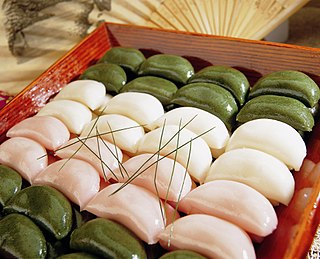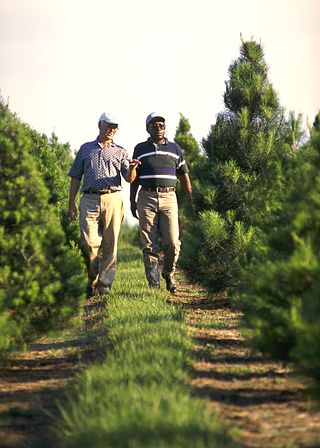
The Mid-Autumn Festival, also known as the Moon Festival or Mooncake Festival, is a harvest festival celebrated in Chinese culture. It is held on the 15th day of the 8th month of the Chinese lunisolar calendar with a full moon at night, corresponding to mid-September to early October of the Gregorian calendar. On this day, the Chinese believe that the moon is at its brightest and fullest size, coinciding with harvest time in the middle of autumn.

Makar(a) Sankranti, also referred to as Uttarayana, Makar, or simply Sankranti, is a Hindu observance and a festival. Usually falling on the date of 14 January annually, this occasion marks the transition of the sun from the zodiac of Sagittarius (dhanu) to Capricorn (makara). Since the sun has made this transition which vaguely coincides with moving from south to north, the festival is dedicated to the solar deity, Surya, and is observed to mark a new beginning. Many native multi-day festivals are organised on this occasion all over India.

Vishu is a Hindu festival celebrating the Malayali New Year in Kerala, Tulu Nadu, and Mahe of India. Vishu falls on the first day of the month of Medam in the Malayalam Calendar. It is the traditional new year, while the Kollam era calendar new year falls on the 1st Chingham.

Harvesting is the process of collecting plants, animals, or fish as food, especially the process of gathering mature crops, and "the harvest" also refers to the collected crops. Reaping is the cutting of grain or pulses for harvest, typically using a scythe, sickle, or reaper. On smaller farms with minimal mechanization, harvesting is the most labor-intensive activity of the growing season. On large mechanized farms, harvesting uses farm machinery, such as the combine harvester. Automation has increased the efficiency of both the seeding and harvesting processes. Specialized harvesting equipment, using conveyor belts for gentle gripping and mass transport, replaces the manual task of removing each seedling by hand. The term "harvesting" in general usage may include immediate postharvest handling, including cleaning, sorting, packing, and cooling.

Chuseok, also known as Hangawi, is a major mid-autumn harvest festival and a three-day holiday in South Korea celebrated on the 15th day of the 8th month of the lunisolar calendar on the full moon. In North Korea, they only celebrate for the day of chuseok. Like many other harvest festivals around the world, it is held around the autumn equinox, i.e. at the very end of summer or in early autumn. It is the biggest traditional holiday in South Korea.

A market garden is the relatively small-scale production of fruits, vegetables and flowers as cash crops, frequently sold directly to consumers and restaurants. The diversity of crops grown on a small area of land, typically from under 0.40 hectares to some hectares, or sometimes in greenhouses, distinguishes it from other types of farming. A market garden is sometimes called a truck farm in the US.

A harvest festival is an annual celebration that occurs around the time of the main harvest of a given region. Given the differences in climate and crops around the world, harvest festivals can be found at various times at different places. Harvest festivals typically feature feasting, both family and public, with foods that are drawn from crops.
Saint Mark's Day, or the Feast of Saint Mark, commemorates Mark the Evangelist and takes place on April 25.

Isidore the Laborer, also known as Isidore the Farmer, was a Spanish farmworker known for his piety toward the poor and animals. He is the Catholic patron saint of farmers, and of Madrid; El Gobernador, Jalisco; La Ceiba, Honduras; and of Tocoa, Honduras. His feast day is celebrated on 15 May.

Thanksgiving or Thanksgiving Day, is an annual Canadian holiday held on the second Monday in October. Outside the country, it may be referred to as Canadian Thanksgiving to distinguish it from the American holiday of the same name and related celebrations in other regions.

Thanksgiving is a federal holiday in the United States celebrated on the fourth Thursday of November. Outside the country, it is sometimes called American Thanksgiving to distinguish it from the Canadian holiday of the same name and related celebrations in other regions. It originated as a day of thanksgiving and harvest festival, with the theme of the holiday revolving around giving thanks and the centerpiece of celebrations remaining a Thanksgiving dinner.

Thanksgiving is a national holiday celebrated on various dates in October and November in the United States, Canada, Saint Lucia, Liberia, and unofficially in countries like Brazil, Germany and the Philippines. It is also observed in the Dutch town of Leiden and the Australian territory of Norfolk Island. It began as a day of giving thanks for the blessings of the harvest and of the preceding year. Various similarly named harvest festival holidays occur throughout the world during autumn. Although Thanksgiving has historical roots in religious and cultural traditions, it has long been celebrated as a secular holiday as well.

Christmas tree cultivation is an agricultural, forestry, and horticultural occupation which involves growing pine, spruce, and fir trees specifically for use as Christmas trees.
A You-Pick ("U-Pick") or Pick-Your-Own (PYO) farm operation is a type of farm gate direct marketing (farm-to-table) strategy where the emphasis is on customers doing the harvesting themselves and agritourism. A PYO farm might be preferred by people who like to select fresh, high quality, vine-ripened produce themselves at lower prices.

Pembrokeshire has been called "the cottage garden of Wales", due to its good soil and the beneficial effects of the Gulf Stream, which provide a mild climate and a longer growing season than other parts of the country. The good climate and soil meant that the south of the peninsula was coveted by the Norsemen and Normans because it had "great plentie" of corn and cattle The county has prime agricultural land, much of which is located at about 70m above sea level, while to the north, the Preseli Hills rise to 500m above sea level and form uplands that are made up of heather and bracken, which are used for grazing sheep. Consequently, Pembrokeshire is classed as one of the most fertile counties in Wales, with its 392,300 agricultural acres having 14% of its land classed as of good quality, 67% being classed as medium quality and 19% being classed as poor quality. However, agricultural production is subject to market forces and in the 1890s, as a result of the Panic of 1893, a deep agricultural depression led to the area under cultivation falling by a third. Many labourers and farmers had no option but to emigrate to the New World and many of the large farming estates were sold. World War I brought prosperity again, but by the 1930s, as a result of the Great Depression, there was another agricultural depression which lasted until World War II. During the Post-war period agriculture has benefited from marketing schemes and marketing boards, which have helped in the regulation, marketing and distribution of the county's agricultural production.

Agera is a thanksgiving harvest festival celebrated by the Roman Catholic community of Mumbai primarily the Bombay East Indians. This festival is also celebrated in Mumbai, Thane, Raigad and Vasai.
Folk festivals are an important part of American community life. For the American people, popular folk festivals are important events composed of complex folklore phenomena. Folk festivals are generally used to celebrate folk music and traditional folk crafts, and some folk festivals are embodied in the form of dance and art. Some festivals are used to celebrate the harvest of crops or to gather people to watch performances and enjoy music, dance and folk culture on a specific day. These folk festivals can be categorized into music, dance, traditional culture and art as well as traditional crafts. Some folk festivals have a long history and they have been passed down from generation to generation. Even the folk festivals that have been recognized by people in recent years have received attention. There are hundreds of folk festivals in American waiting to be celebrated, and each festival has its own characteristics and style. As an inclusive country that incorporates a diverse culture, folk festivals are important events for the American people. More music festivals exist in American whether it is outdoors or indoors, the festival attracts a large number of visitors and tourists. This behavior not only promotes the economic development of every city in American, but also makes folk festivals more and more popular. In the American folk festivals, there are also some folk festivals for charity. These festivals will be held in the form of music festivals or festivals, and all the money received through the event will be used to finance poor children or for medical purposes. At the same time, some folk festivals that celebrate the harvest are also used as charity events. Crops and fruits obtained by farmers through labor are made into food or sold directly to tourists in exchange for money. These funds acquired on folk festivals are also used for charity. Folk festivals are not only a way for Americans to relax from their busy work, but also a symbol of history and culture.
The Lala people are a Bantu ethnic group found in the Serenje District of the Central Province of Zambia.

Yam is a staple food in West Africa and other regions classified as a tuber crop and it is an annual or perennial crop. The New Yam festival is celebrated by almost every ethnic group in Nigeria and is observed annually at the end of June.















